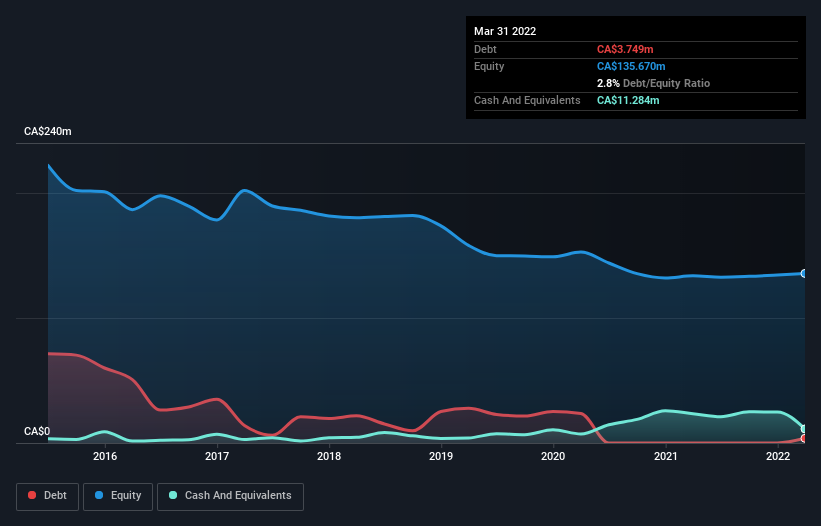Is PHX Energy Services (TSE:PHX) A Risky Investment?
The external fund manager backed by Berkshire Hathaway's Charlie Munger, Li Lu, makes no bones about it when he says 'The biggest investment risk is not the volatility of prices, but whether you will suffer a permanent loss of capital.' So it might be obvious that you need to consider debt, when you think about how risky any given stock is, because too much debt can sink a company. Importantly, PHX Energy Services Corp. (TSE:PHX) does carry debt. But should shareholders be worried about its use of debt?
Why Does Debt Bring Risk?
Debt assists a business until the business has trouble paying it off, either with new capital or with free cash flow. If things get really bad, the lenders can take control of the business. However, a more usual (but still expensive) situation is where a company must dilute shareholders at a cheap share price simply to get debt under control. By replacing dilution, though, debt can be an extremely good tool for businesses that need capital to invest in growth at high rates of return. When we examine debt levels, we first consider both cash and debt levels, together.
Check out our latest analysis for PHX Energy Services
How Much Debt Does PHX Energy Services Carry?
You can click the graphic below for the historical numbers, but it shows that as of March 2022 PHX Energy Services had CA$3.75m of debt, an increase on none, over one year. But on the other hand it also has CA$11.3m in cash, leading to a CA$7.53m net cash position.
How Strong Is PHX Energy Services' Balance Sheet?
The latest balance sheet data shows that PHX Energy Services had liabilities of CA$92.3m due within a year, and liabilities of CA$46.9m falling due after that. Offsetting this, it had CA$11.3m in cash and CA$90.5m in receivables that were due within 12 months. So its liabilities total CA$37.4m more than the combination of its cash and short-term receivables.
Of course, PHX Energy Services has a market capitalization of CA$305.6m, so these liabilities are probably manageable. However, we do think it is worth keeping an eye on its balance sheet strength, as it may change over time. While it does have liabilities worth noting, PHX Energy Services also has more cash than debt, so we're pretty confident it can manage its debt safely.
Notably, PHX Energy Services made a loss at the EBIT level, last year, but improved that to positive EBIT of CA$2.8m in the last twelve months. When analysing debt levels, the balance sheet is the obvious place to start. But it is future earnings, more than anything, that will determine PHX Energy Services's ability to maintain a healthy balance sheet going forward. So if you're focused on the future you can check out this free report showing analyst profit forecasts.
Finally, a business needs free cash flow to pay off debt; accounting profits just don't cut it. While PHX Energy Services has net cash on its balance sheet, it's still worth taking a look at its ability to convert earnings before interest and tax (EBIT) to free cash flow, to help us understand how quickly it is building (or eroding) that cash balance. During the last year, PHX Energy Services burned a lot of cash. While investors are no doubt expecting a reversal of that situation in due course, it clearly does mean its use of debt is more risky.
Summing up
While PHX Energy Services does have more liabilities than liquid assets, it also has net cash of CA$7.53m. So while PHX Energy Services does not have a great balance sheet, it's certainly not too bad. There's no doubt that we learn most about debt from the balance sheet. However, not all investment risk resides within the balance sheet - far from it. For example, we've discovered 3 warning signs for PHX Energy Services that you should be aware of before investing here.
At the end of the day, it's often better to focus on companies that are free from net debt. You can access our special list of such companies (all with a track record of profit growth). It's free.
Have feedback on this article? Concerned about the content? Get in touch with us directly. Alternatively, email editorial-team (at) simplywallst.com.
This article by Simply Wall St is general in nature. We provide commentary based on historical data and analyst forecasts only using an unbiased methodology and our articles are not intended to be financial advice. It does not constitute a recommendation to buy or sell any stock, and does not take account of your objectives, or your financial situation. We aim to bring you long-term focused analysis driven by fundamental data. Note that our analysis may not factor in the latest price-sensitive company announcements or qualitative material. Simply Wall St has no position in any stocks mentioned.

 Yahoo Movies
Yahoo Movies 

